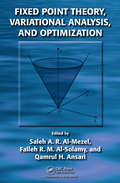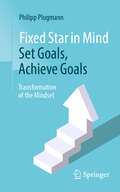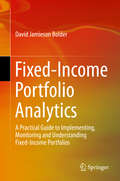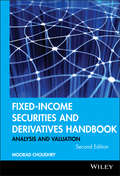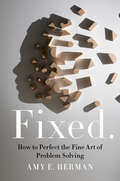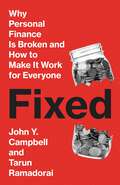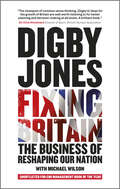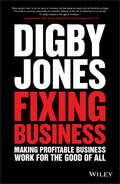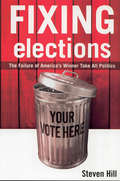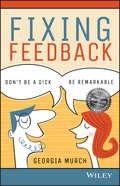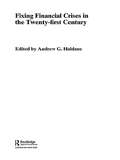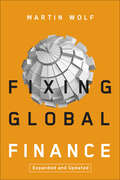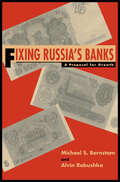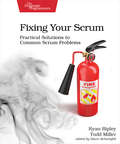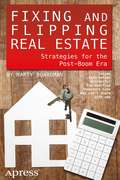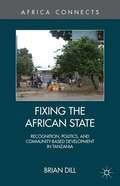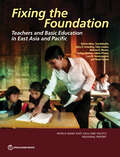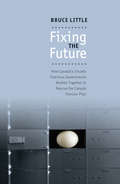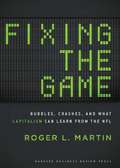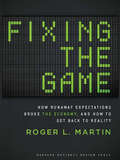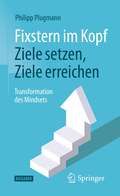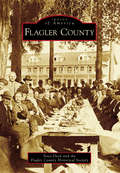- Table View
- List View
Fixed Point Theory, Variational Analysis, and Optimization
by Saleh A. R. Al-Mezel Falleh R. M. Al-Solamy Qamrul H. AnsariFixed Point Theory, Variational Analysis, and Optimization not only covers three vital branches of nonlinear analysis-fixed point theory, variational inequalities, and vector optimization-but also explains the connections between them, enabling the study of a general form of variational inequality problems related to the optimality conditions invol
Fixed Star in Mind: Transformation of the Mindset
by Philipp PlugmannFixing Your Star in Mind – Setting and Achieving Goals This book helps you unlock your full potential, adopt new mindsets, and advance your personal development. It keeps your personal "fixed star" in sight, enabling you to set specific goals and achieve them. Even when obstacles, tasks, and other people complicate the journey, you can use the strategies outlined in this book to overcome internal and external hurdles and reach your goals successfully. Using the metaphor of life as a long race, where winners are recognized not at the start but at the finish, the author illustrates that success often doesn’t go to those with the greatest talents or the best circumstances, but to those with a well-thought-out and radical approach to learning and work. You will learn how to effectively manage old thought patterns, challenges, and limiting habits on your way to personal success. Target audience: Anyone who wants to get more out of life. About the author: Prof. Dr. Dr. Philipp Plugmann has been working as a dentist and implantologist for 22 years, is a multiple entrepreneur, and is currently working on his third doctoral thesis. He has published numerous works and has been active for many years in higher education and as a mentor, earning recognition for his exceptional teaching and engagement.
Fixed-Income Portfolio Analytics
by David Jamieson BolderThe book offers a detailed, robust, and consistent framework for the joint consideration of portfolio exposure, risk, and performance across a wide range of underlying fixed-income instruments and risk factors. Through extensive use of practical examples, the author also highlights the necessary technical tools and the common pitfalls that arise when working in this area. Finally, the book discusses tools for testing the reasonableness of the key analytics to help build and maintain confidence for using these techniques in day-to-day decision making. This will be of keen interest to risk managers, analysts and asset managers responsible for fixed-income portfolios.
Fixed-Income Securities and Derivatives Handbook: Analysis and Valuation (Bloomberg Financial #122)
by Moorad ChoudhryThe definitive guide to fixed-come securities-revised to reflect today's dynamic financial environment The Second Edition of the Fixed-Income Securities and Derivatives Handbook offers a completely updated and revised look at an important area of today's financial world. In addition to providing an accessible description of the main elements of the debt market, concentrating on the instruments used and their applications, this edition takes into account the effect of the recent financial crisis on fixed income securities and derivatives. As timely as it is timeless, the Second Edition of the Fixed-Income Securities and Derivatives Handbook includes a wealth of new material on such topics as covered and convertible bonds, swaps, synthetic securitization, and bond portfolio management, as well as discussions regarding new regulatory twists and the evolving derivatives market. Offers a more detailed look at the basic principles of securitization and an updated chapter on collateralized debt obligations Covers bond mathematics, pricing and yield analytics, and term structure models Includes a new chapter on credit analysis and the different metrics used to measure bond-relative value Contains illustrative case studies and real-world examples of the topics touched upon throughout the book Written in a straightforward and accessible style, Moorad Choudhry's new book offers the ideal mix of practical tips and academic theory within this important field.
Fixed.: How to Perfect the Fine Art of Problem Solving
by Amy E HermanWith Amy Herman’s Fixed., we now have access to what the FBI, NATO, the State Department, Interpol, Scotland Yard, and many more organizations and their leaders have been using to solve their most intractable problems.Demonstrating a powerful paradigm shift for finding solutions, Herman teaches us to see things differently, using art to challenge our default thinking and open up possibilities otherwise overlooked. Her unexpected, insightful, and often delightful methodology is sought after by leaders and professionals for whom failure is catastrophic. Luckily for us, these tactics work— no matter the problem’s scale or complexity. And we don’t need an art degree or previous knowledge about art to benefit from her approach, only a willingness to open our eyes and our minds. Yes, things go wrong all the time. What matters most is what we do to fix them.
Fixed: Why Personal Finance Is Broken and How to Make It Work for Everyone
by John Y. Campbell Tarun RamadoraiTwo leading economists reveal why today&’s personal finance markets are rigged against us and offer practical steps to fix themWe interact with the financial system every day, whether taking out or paying off loans, making insurance claims, or simply depositing money into our bank accounts. Fixed exposes how this system has been corrupted to serve the interests of financial services providers and their cleverest customers—at the expense of ordinary people.John Campbell and Tarun Ramadorai diagnose the ills of today&’s personal finance markets in the United States and across the globe, looking at everything from short-term saving and borrowing to loans for education and housing, financial products for retirement, and insurance. They show how the system is &“fixed&” to benefit those who are wealthy and more educated while encouraging financial mistakes by those who are aren&’t, making it difficult for regular consumers to make sound financial decisions and disadvantaging them in some of the most consequential economic transactions of their lives. Campbell and Ramadorai describe how some even opt out of the financial system altogether, relying on unregulated and often shady mechanisms to implement necessary financial functions, with dire consequences for individuals, families, and the economy more broadly.With the explosive growth of the global middle class, longer lifespans, and greater numbers of seniors managing their money alone, the pitfalls of personal finance now affect billions of people around the world. Fixed proposes concrete solutions that harness the expertise of economists, the power of government, and the speed of technology to restore fairness and trust in our broken system and make it work better for ordinary people.
Fixing Britain
by Michael Wilson Lord Digby JonesNo nonsense solutions from the straight-talking face of British business.IF FUNDAMENTAL REFORM DOES NOT TAKE PLACE THEN WE ARE DEAD IN THE WATER.GLOBALISATION DOES NOT TAKE PRISONERS. BRITAIN MUST BECOME FIT FOR PURPOSE IN THE 21ST CENTURY.This is the explosive, first book from 'the face of British business', Lord Digby Jones. With a renowned, no-nonsense, straight-talking approach, he is one of the world's most acclaimed business commentators.In his candid and forthright style Fixing Britain puts the spotlight on critical national and international business issues and lays out the essential reform urgently needed for the growth of our nation. Knowledgeable, authoritative and independent, Digby highlights how untenable the status quo is in the UK, and sets out how Britain can get back in - and stay in - the globalised race.Sending a clear message to government, business leaders, strategists and the media, Fixing Britain explores the effective linkage of change at all levels, from Westminster to education, the public and private sectors, our social cohesion and our sense of common purpose.Digby is never afraid to say what others are thinking - this is the most explosive examination of the state of British business in years.
Fixing Business: Making Profitable Business Work for The Good of All
by Lord Digby JonesAn optimistic call to action for business leaders and decision makers everywhere In his second book ‘the face of British Business' Lord Digby Jones shows us why profit isn't a dirty word—it's what you do with it that counts. Society is at a crossroads, and good business lays the foundation for a successful future; but are we brave enough to build it? Fixing Business focuses on why we must be. Fixing the world requires a vibrant and successful, profit-yielding, tax-delivering, job-creating business sector. This book describes how that sector is built, and how the good of business means the good of all. Learn why business must invest more—and better—in physical and human infrastructure Discover the critical importance of social inclusion in the future of business Understand why fixing education and the environment are at the top of the priority list Engage with every aspect of society to create the wealth that holds the social fabric together From the smallest shop around the corner to the largest multinational corporation, the variable upon which every facet of business success rests is people. Workers, investors, customers, creditors—all ensure that wealth is created, and at the end of the day, they are what business is about. Fixing Business shows us how to harness their power to change the world.
Fixing Drugs
by Sue PryceIn this unique and engaging book, Sue Pryce tackles the major issues surrounding drug policy. Why do governments persist with prohibition policies, despite their proven inefficacy? Why are some drugs criminalized, and some not? And why does society care about drug use at all? Pryce guides us through drug policy around the world.
Fixing Elections: The Failure of America's Winner Take All Politics
by Steven HillFixing Elections shows our whole 18th-century Winner Take All political system, including the way we elect our legislatures. Steven Hill argues our geographic-based, Winner Take All political system is at the root of many of our worst political problems, including poor minority and majority representation, low voter turnout, expensive mudslinging campaigns, congressional gridlock, regional balkanization, and the growing divide between city-dwellers and middle-America.
Fixing Facebook: Fake News, Privacy, and Platform Governance
by David B. Yoffie Daniel FisherMark Zuckerberg founded Facebook based on the idea that connecting people was a fundamentally good thing-and a way to turn a handsome profit. But from the beginning, Facebook received criticism both for how it handled user privacy and how it curated user-generated content. These two issues coalesced in the aftermath of the 2016 United States presidential election, after Facebook's role in the spread of political misinformation and the leak of Facebook user data to political consulting firms began to receive significant media coverage. In 2019, Facebook announced it was shifting to a "digital living room" model that would focus more on private, encrypted conversations and less on sharing viral content. Several important questions remained. Would the digital living room ease users' privacy concerns? Would Facebook still be able to effectively curate content? Would its advertising model still work? Or were financial success and good governance mutually exclusive? This case explores the parameters of governing an internet-based platform.
Fixing Feedback
by Georgia MurchFeedback is broken -- here's how to fix it to create a highly engaged workplace with high performing leaders and employees Fixing Feedback is not just another management book -- it's a smart, refreshing, practical guide to feedback in the workplace. Everyone already knows how important feedback is, and we all know we should be giving it and receiving it regularly -- yet we still do it poorly or avoid it entirely. This book shows you how to do it right. You'll learn what exactly constitutes useful feedback, how to deliver it effectively, how to receive it gracefully and how to use it to strengthen yourself, your team and your business. You'll learn critical communication skills that you can put into practice today, and get on track to building a "feedback culture" that results in highly engaged, highly productive employees. The way you communicate dictates how you build relationships and make decisions. It's the difference between being remarkable and being a d!ck. Poor communication is a major force driving feedback into the ground, and it can be extremely costly for the company as a whole. This book shows you how to turn the ship around by making feedback a meaningful -- and welcome -- part of your everyday workflow and overall company culture. Understand "remarkable feedback", and how it changes people and workplaces Self-assess your communication style and gauge the impact it has on others Deliver meaningful feedback using a set of pragmatic tools and techniques Confront the personal issues that prevent you from effectively receiving feedback Learn what organisations need to drive to create a 'feedback culture' When organisations fail to grasp the importance of investing in their people effectively, employees disengage. Building a meaningful feedback culture, on the other hand, makes your organisation a place where people want to work, want to achieve and want to be the best. It's all about effective communication. Fixing Feedback provides no-nonsense guidance toward equipping your people to succeed.
Fixing Feedback: Don't Be A D!ck, Be Remarkable
by Georgia MurchFeedback is broken — here's how to fix it to create a highly engaged workplace with high performing leaders and employees Fixing Feedback is not just another management book — it's a smart, refreshing, practical guide to feedback in the workplace. Everyone already knows how important feedback is, and we all know we should be giving it and receiving it regularly — yet we still do it poorly or avoid it entirely. This book shows you how to do it right. You'll learn what exactly constitutes useful feedback, how to deliver it effectively, how to receive it gracefully and how to use it to strengthen yourself, your team and your business. You'll learn critical communication skills that you can put into practice today, and get on track to building a "feedback culture" that results in highly engaged, highly productive employees. The way you communicate dictates how you build relationships and make decisions. It's the difference between being remarkable and being a d!ck. Poor communication is a major force driving feedback into the ground, and it can be extremely costly for the company as a whole. This book shows you how to turn the ship around by making feedback a meaningful — and welcome — part of your everyday workflow and overall company culture. Understand "remarkable feedback", and how it changes people and workplaces Self-assess your communication style and gauge the impact it has on others Deliver meaningful feedback using a set of pragmatic tools and techniques Confront the personal issues that prevent you from effectively receiving feedback Learn what organisations need to drive to create a 'feedback culture' When organisations fail to grasp the importance of investing in their people effectively, employees disengage. Building a meaningful feedback culture, on the other hand, makes your organisation a place where people want to work, want to achieve and want to be the best. It's all about effective communication. Fixing Feedback provides no-nonsense guidance toward equipping your people to succeed.
Fixing Financial Crises in the 21st Century
by Andrew G. HaldaneFinancial crises have dogged the international monetary system over recent years. They have impoverished millions of people around the world, especially within developing countries. And they have called into question the very process of globalization. Yet there remains no intellectual consensus on how best to avert such crises, much less resolve th
Fixing Global Finance (Forum on Constructive Capitalism)
by Martin WolfSince 2008, when Fixing Global Finance was first published, the collapse of the housing and credit bubbles of the 2000s has crippled the world’s economy. In this updated edition, Financial Times columnist Martin Wolf explains how global imbalances helped cause the financial crises now ravaging the U.S. economy and outlines steps for ending this destructive cycle—of which this is the latest and biggest. An expanded conclusion recommends near- and long-term measures to stabilize and protect financial markets in the future. Reviewing global financial crises since 1980, Wolf lays bare the links between the microeconomics of finance and the macroeconomics of the balance of payments, demonstrating how the subprime lending crisis in the United States fits into a pattern that includes the economic shocks of 1997, 1998, and early 1999 in Latin America, Russia, and Asia. He explains why the United States became the "borrower and spender of last resort," makes the case that this was an untenable arrangement, and argues that global economic security depends on radical reforms in the international monetary system and the ability of emerging economies to borrow sustainably in domestic currencies.Sharply and clearly argued, Wolf’s prescription for fixing global finance illustrates why he has been described as "the world's preeminent financial journalist."
Fixing Russia's Banks: A Proposal for Growth
by Alvin Rabushka Michael S. BernstamFixing Russia's Banks documents how Russia's financial system is built on what Michael S. Bernstam and Alvin Rabushka call ersatz banks. These inferior imitation banks have served largely as tools of the government to redistribute public funds to favored firms. The highly vaunted achievements of privatization, removal of price controls, and foreign trade liberalization have failed to produce growth because of a lack of private financing. National income has declined nearly 40 percent since 1992, with no recovery in sight.
Fixing Your Scrum: Practical Solutions to Common Scrum Problems
by Todd Miller Ryan RipleyA Scrum Master's work is never done. The Development team needs your support, the Product Owner is often lost in the complexities of agile product management, and your managers and stakeholders need to know what will be done, by when, and for how much. Learn how experienced Scrum Masters balance the demands of these three levels of servant leadership while removing organizational impediments and helping Scrum Teams deliver real world value. Discover how to visualize your work, resolve impediments, and empower your teams to self-organize and deliver using the Scrum Values, Agile Principles, and advanced coaching and facilitation techniques. A Scrum Master needs to know when their team is in trouble and understand how to help them get back on the path to delivery. Become a better Scrum master so you can find the problems holding your teams back. Has your Daily Scrum turned in to a meeting? Does your team struggle with creating user stories? Are stakeholders disengaged during Sprint Review? These issues are common. Learn to use empiricism as your guide and help your teams create great products. Scrum is so much more than a checklist of practices to follow, yet that's exactly how many organizations practice it. Bring life back to your Scrum events by using advanced facilitation techniques to leverage the full intelligence of your team. Improve your retrospectives with new formats and exercises. Ask powerful questions that spark introspection and improvement. Get support and buy-in from management. Use Scrum as a competitive advantage for your organization. Create a definition of done that improves quality and fix failing sprints. Take the next step on your journey as a Scrum master. Transform your Scrum practices to help your teams enjoy their work again as they deliver high quality products that bring value to the world. What You Need: A moderate level of experience using the Scrum Framework.
Fixing and Flipping Real Estate: Strategies for the Post-Boom Era
by Marty BoardmanLet’s face it—fixing and flipping houses is sexy. Who doesn’t love the idea of buying a rundown, mold-infested shack and transforming it into someone’s dream home for massive profits? Reality TV shows make it look so easy. A little paint here, some new kitchen cabinets there, and presto! The house is sold for big bucks and everyone lives happily ever after. <p><p>If only it were that simple. Fixing and flipping houses is a business. In order for a business to survive, prosper, and grow, systems must be put in place. Fixing and Flipping Real Estate: Strategies for the Post-Boom Era is a book that breaks down the four essential components of a fix-and-flip business, giving you the building blocks to efficiently buy and sell 1 to 20 properties a month in today’s post-boom era housing market. You’ll learn about each of the boxes: <p>•Acquisition—How to find and buy a profitable real estate deal. <p>•Rehabbing—How to systematically remodel a house and how not to underimprove, or overimprove, your property. <p>•Sales—How to sell your flip for the highest possible price in the shortest possible time. <p>•Raising Capital—How to get the capital you need to grow your business, including using other people’s money, for your real estate deals without getting sued or going to jail. <p><p>In the post-real estate boom era, fixing and flipping is again a solid business--especially in the “sand” states—Arizona, California, Nevada, Texas, and Florida, among others. It’s also a good bet in states as diverse as North Carolina and Washington State. And with the real estate market projected to bottom out nationally in 2012 (this time for real), there are plenty of houses to be renovated and plenty of money to be made by the enterprising in all fifty states. This book shows real estate investors everything they need to know to get started fixing and reselling houses either as a substantial sideline or a full-on business.
Fixing the African State
by Brian DillFixing the African State explains why the predominant approach to international development produces outcomes that are incompatible with its underlying assumptions and intended objectives. Drawing on extensive ethnographic research undertaken in Dar es Salaam, Tanzania over the past decade, Brian J. Dill examines the relationship between community participation in the development process and the exercise of state power. Although the primary objective of community-based and -driven development is to shift the balance of power from the state to the benefit of non-state actors, Fixing the African State shows that, in fact, what is strengthened is both the image of a coherent, efficacious, and autonomous state, and the capacity of the state apparatus to exercise authority.
Fixing the Foundation: Teachers and Basic Education in East Asia and Pacific (World Bank East Asia and Pacific Regional Report)
by Aaditya Mattoo Tara Beteille Rythia Afkar Mary Breeding Linden Tobias Pfutze Lars Sondergaard Noah YarrowCountries in middle-income East Asia and the Pacific were already experiencing serious learning deficits prior to the COVID-19 pandemic. COVID-related school disruptions have only made things worse. Learning poverty -- defined as the percentage of 10-year-olds who cannot read and understand an age-appropriate text -- is as high as 90 percent in several countries. Several large Southeast Asian countries consistently perform well below expectations on adolescent learning assessments. This report examines key factors affecting student learning in the region, with emphasis on the central role of teachers and teaching quality. It also analyzes the role education technologies, which came into widespread use during the pandemic, and examines the political economy of education reform. The report presents recommendations on how countries can strengthen teaching to improve learning and, in doing so, can enhance productivity, growth, and future development in the region.
Fixing the Future: How Canada's Usually Fractious Governments Worked Together to Rescue the Canada Pension Plan
by Bruce LittleIn 1993, most Canadians believed that big government deficits were permanent and that the Canada Pension Plan (CPP) was in such deep trouble that younger Canadians would never collect a retirement pension. They believed too that Canada's politicians were incapable of dealing with either problem. Yet by 1998, both were essentially solved.<P><P> While the deficit battles have been recounted many times, the story of the reform that rescued the CPP has gone almost entirely untold. In Fixing the Future, Bruce Little explains the CPP overhaul and shows why it stands as one of Canada's most significant public policy success stories, in part because it demanded an almost unparalleled degree of federal-provincial co-operation. Providing an overview of the CPP's entire history from its beginning in 1965, Little pulls together published, and new unpublished, material relating to the CPP reform, and interviews over fifty politicians, government officials, and others who were deeply involved in the reforms for their recollections, insights, and observations.<P> A superbly told history of one of Canada's most important public policy issues, Fixing the Future will be of interest to political scientists, historians, economists, and anyone concerned about their retirement.
Fixing the Game
by Roger L. MartinAmerican capitalism is in dire straits, caught in a perilous pattern of increasing volatility, decreasing investor returns, and ongoing bad behavior by executives. And it's getting worse. Since the turn of the twenty-first century, we've seen two massive value-destroying market meltdowns and a string of ethics breaches, including accounting scandals, options-backdating schemes, and the subprime mortgage debacle.Just what is going on here? Is it the inevitable decline of the American economy? Is it the new normal in a technology-enabled global marketplace? Or is it possible that the very theories we've embraced to underpin our capital markets are actually producing these crises?In Fixing the Game, Roger Martin reveals the culprit behind the sorry state of American capitalism: our deep and abiding commitment to the idea that the purpose of the firm is to maximize shareholder value. This theory has led to a massive growth in stock-based compensation for executives and, through this, to a naive and wrongheaded linking of the real market-the business of designing, making, and selling products and services-with the expectations market-the business of trading stocks, options, and complex derivatives. Martin shows how this tight coupling has been engineered and lays out its results: a single-minded focus on the expectations market that will continue driving us from crisis to crisis-unless we act now.Using the National Football League as his primary example, Martin illustrates that it is possible to take a much more thoughtful and effective approach than we now do to the intersection of the real and the expectations markets and to governance in general in the capital markets. Martin shows how we can act to end the destructive cycle, including: Restructuring executive compensation to focus entirely on the real market, not the expectations market Rethinking the meaning of board governance and role of board members Reining in the power of hedge funds and monopoly pension fundsConcise, hard-hitting, and entertaining, Fixing the Game advocates seizing American capitalism from the jaws of the expectations market and planting it firmly in the real market-and it presents the steps we must take now to do so.
Fixing the Game
by Roger L. MartinAmerican capitalism is in dire straits, caught in a perilous pattern of increasing volatility, decreasing investor returns, and ongoing bad behavior by executives. And it's getting worse. Since the turn of the twenty-first century, we've seen two massive value-destroying market meltdowns and a string of ethics breaches, including accounting scandals, options-backdating schemes, and the subprime mortgage debacle.Just what is going on here? Is it the inevitable decline of the American economy? Is it the new normal in a technology-enabled global marketplace? Or is it possible that the very theories we've embraced to underpin our capital markets are actually producing these crises?In Fixing the Game, Roger Martin reveals the culprit behind the sorry state of American capitalism: our deep and abiding commitment to the idea that the purpose of the firm is to maximize shareholder value. This theory has led to a massive growth in stock-based compensation for executives and, through this, to a naive and wrongheaded linking of the real market-the business of designing, making, and selling products and services-with the expectations market-the business of trading stocks, options, and complex derivatives. Martin shows how this tight coupling has been engineered and lays out its results: a single-minded focus on the expectations market that will continue driving us from crisis to crisis-unless we act now.Using the National Football League as his primary example, Martin illustrates that it is possible to take a much more thoughtful and effective approach than we now do to the intersection of the real and the expectations markets and to governance in general in the capital markets. Martin shows how we can act to end the destructive cycle, including: Restructuring executive compensation to focus entirely on the real market, not the expectations market Rethinking the meaning of board governance and role of board members Reining in the power of hedge funds and monopoly pension fundsConcise, hard-hitting, and entertaining, Fixing the Game advocates seizing American capitalism from the jaws of the expectations market and planting it firmly in the real market-and it presents the steps we must take now to do so.
Fixstern im Kopf: Transformation des Mindsets
by Philipp PlugmannFixstern im Kopf – Ziele setzen, Ziele erreichen Dieses Buch hilft Ihnen dabei, Ihr volles Potential zu entfalten, sich dabei neue Denkmuster anzueignen und Ihre weitere Persönlichkeitsentwicklung voranzubringen. Dabei lassen Sie Ihren persönlichen Fixstern nie aus den Augen, setzen sich konkrete Ziele und erreichen diese. Auch wenn Widerstände, Aufgaben und andere Menschen den Weg erschweren, können Sie mit den Empfehlungen in diesem Werk nützliche und erfolgversprechende Strategien einsetzen, um interne und externe Hürden zu meistern und die gesetzten Ziele zu erreichen. Anhand der Metapher, dass das Leben ein Langzeitrennen ist und die Sieger nicht am Start, sondern am Ziel erkannt werden, verdeutlicht Ihnen der Autor, dass häufig nicht diejenigen mit den größten Talenten oder mit den besten Rahmenbedingungen gewinnen, sondern diejenigen mit einer klug durchdachten und radikalen Lern- und Arbeitseinstellung. Sie erfahren, wie der Umgang mit alten Denkmustern, Herausforderungen und hinderlichen Gewohnheiten auf dem Weg zu Ihren persönlichen Zielen erfolgreich gestaltet werden kann. Zielgruppen: alle, die mehr aus ihrem Leben machen wollen. Zum Autor: Prof. Dr. Dr. Philipp Plugmann ist seit 22 Jahren als Zahnarzt und Implantologe tätig, mehrfacher Unternehmensgründer und arbeitet derzeit an seiner dritten Doktorarbeit. Dazu hat er zahlreich publiziert und ist seit vielen Jahren an Hochschulen und als Mentor aktiv und wurde für herausragende Lehre und Engagement ausgezeichnet.
Flagler County (Images of America)
by Sisco Deen The Flagler County Historical SocietyFlagler County was created in 1917 from portions of southern St. Johns County and northern Volusia County. The county was named after Henry Morrison Flagler, a railroad and oil tycoon, who was a developer of the Florida East Coast Railway during the 1880s and 1900s. Bunnell, located 30 miles south of St. Augustine, was established as the county seat. Joseph Marion Hernandez, the first Hispanic to serve in the US Congress, had three successful sugar plantations in Flagler County until they were burned down by Native Americans in 1836, during the Second Seminole War. Marine Studios, later named Marineland, opened in 1938 as the world�s first underwater motion picture studio. The economic driving force in the county until the early 1970s was its agriculture and forestry industry. In the late 1960s, International Telephone and Telegraph Corporation (ITT) purchased 22,000 acres of timberland and established the retirement community of Palm Coast. Today, the county thrives upon successful real estate and service industries.
